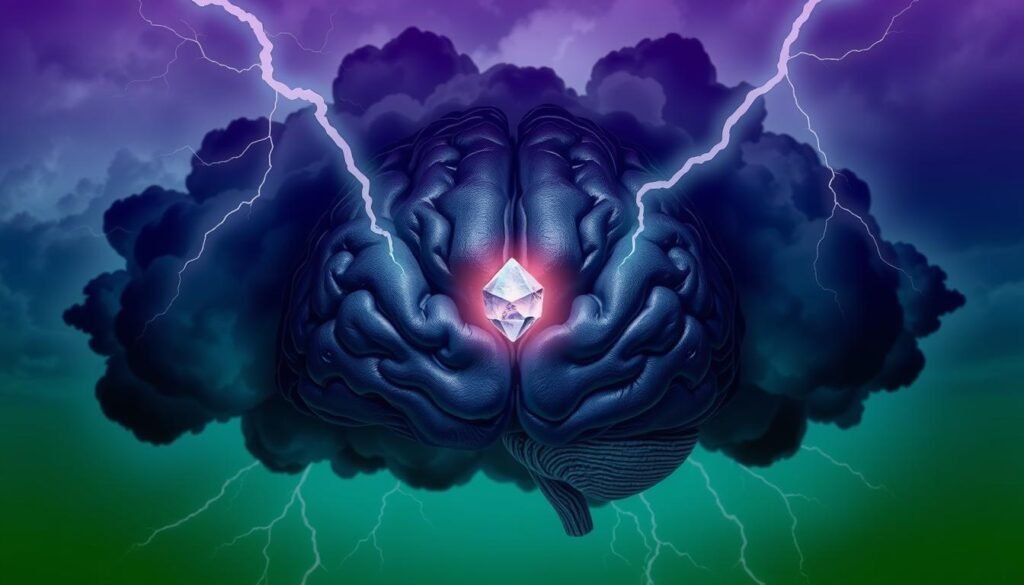Nearly 1 in 5 adults in the United States struggle with anxiety. This fact shows we need good mental health support. Magnesium is a strong helper in the natural fight against anxiety. Studies prove it’s essential for many body functions and eases anxiety symptoms.
Using magnesium to combat anxiety is interesting and useful. This supplement offers a natural way to calm stress. It helps improve your mental health in a big way.
Key Takeaways
- Nearly 1 in 5 adults face anxiety disorders in the U.S.
- Magnesium plays a vital role in supporting mental health.
- This mineral acts as a natural stress relief method.
- Magnesium supplementation can effectively alleviate anxiety symptoms.
- Choosing the right magnesium forms can enhance health benefits.
- Understanding magnesium deficiency is key to improving mental well-being.
Understanding Anxiety Disorders
Anxiety disorders are serious mental health issues. They fill people with fear, worry, and unease. There are many types, like generalized anxiety disorder, panic attacks, and social anxiety.
Those with these disorders might feel a bunch of anxiety signs. These can mess with daily life.
- Excessive worry about everyday issues
- Fatigue and restlessness
- Difficulty concentrating or making decisions
- Physical manifestations such as increased heart rate and sweating
It’s important to understand anxiety disorders. Doing so helps see how magnesium supplements could aid those fighting anxiety. For more info, check Cleveland Clinic.
Knowing about anxiety disorders helps people manage their mental health. They can find good ways to get support and start healing.
What Is Magnesium and Its Importance for Health
Magnesium is an essential mineral that our bodies need. It helps with over 300 biochemical reactions. These include making energy, building proteins, and managing blood pressure.
When it comes to muscles, magnesium is a key player. It keeps muscle contractions normal and prevents cramps. Also, it helps our nerves send messages, which keeps our body in sync.
Magnesium does even more for our health. It helps our hearts beat right and keeps blood pressure normal. Plus, it’s important for bone health and managing minerals like calcium and potassium.
To stay healthy, eating magnesium-rich foods is a good idea. Foods like leafy greens, nuts, seeds, and whole grains are great sources. Adding these to our diet can boost our health, both body and mind.
Magnesium for Anxiety: The Connection Between the Mineral and Mental Well-Being
Magnesium plays a vital role in our brain function, which affects our mood and mental health. It’s essential for many body processes, including mood regulation. People low in magnesium may feel more anxious or depressed.
Research in the Journal of the American Board of Family Medicine shows that not having enough magnesium can lead to more anxiety. This mineral helps with brain chemicals and pathways that affect our feelings.
The journal Nutrients also talks about how getting enough magnesium might reduce anxiety. This shows how keeping magnesium levels up is critical for feeling emotionally balanced and managing stress.
To combat magnesium deficiency, eating foods rich in magnesium or taking supplements can support mental health. Foods like leafy greens, nuts, seeds, and whole grains are good magnesium sources. Taking steps to keep magnesium levels stable can greatly help mental well-being and lower anxiety.
How Magnesium Acts as an Anti-Anxiety Supplement
Magnesium is key in supporting mental health, especially for those with anxiety. It helps regulate the body’s stress response. This is done by controlling the hypothalamic-pituitary-adrenal (HPA) axis.
This axis affects our response to stress, impacting our feelings under pressure. When magnesium levels are right, the body can better handle stress. It has a calming effect on the nervous system. This is crucial for anyone looking for anti-anxiety support.

Magnesium also plays a role in creating neurotransmitters like serotonin. Serotonin controls mood and overall happiness. This balance can lead to improvements in mental health.
Adding magnesium-rich foods or supplements to your day can help ease anxiety. Regular use promotes relaxation and a better mood. It helps maintain a stable mental state. This makes magnesium a great ally for mental well-being.
Natural Stress Relief: The Benefits of Magnesium
Magnesium is vital for natural stress relief. It helps with nerve function and muscle relaxation. These benefits can lead to better sleep and mood.
Studies show magnesium keeps cortisol, the stress hormone, in check. With enough magnesium, the body handles stress better. It may also reduce anxiety, leading to a calmer mind.
- Leafy greens like spinach
- Nuts and seeds, particularly almonds and pumpkin seeds
- Whole grains such as brown rice and quinoa
- Legumes, including black beans and lentils
If you can’t get enough from food, consider magnesium supplements. They make sure you get what you need for mental health.
Embracing magnesium for stress relief brings balance and health. It’s a step towards a holistic, healthy lifestyle.
| Food Source | Magnesium Content (mg per 100g) | Health Benefits |
|---|---|---|
| Spinach | 79 | Boosts immune function, rich in antioxidants |
| Almonds | 268 | Supports heart health, anti-inflammatory properties |
| Quinoa | 64 | Complete protein, aids in muscle recovery |
| Black Beans | 70 | Promotes digestive health, high in fiber |
Identifying Magnesium Deficiency and Its Impact on Mental Health
Knowing how to spot magnesium deficiency is key to staying healthy. Look out for symptoms like muscle cramps, feeling tired, and changes in mood. If you’re having these problems, it’s a good idea to check your magnesium levels.
Magnesium is super important for our bodies, especially for our mind. Not having enough can cause stress, anxiety, and mood issues. The link between low magnesium and mental health is strong and can affect more than our physical state.

Some people are more likely to not have enough magnesium. This includes older folks, people with gut issues, heavy drinkers, and folks on certain meds like water pills.
- Older adults
- Individuals with digestive disorders
- Those who consume excessive amounts of alcohol
- People on certain medications, such as diuretics
Being aware of who’s at risk and the signs can help catch magnesium issues early. This could improve mental health and lower anxiety.
| Common Symptoms | Potential Impact |
|---|---|
| Muscle Cramps | Increased tension and anxiety |
| Fatigue | Decreased cognitive function |
| Mood Swings | Heightened risk of depression |
Grasping these concepts paves the way for better anxiety control. It highlights the importance of enough magnesium for mental health.
Exploring Different Types of Magnesium Supplements
It’s important to know about the different types of magnesium when picking a supplement. Each kind has its own benefits, uses, and how well our body can use it. This affects how well they work for what you need.
| Type of Magnesium | Bioavailability | Uses | Recommendation |
|---|---|---|---|
| Magnesium Citrate | High | General supplementation and constipation relief | Great for beginners |
| Magnesium Oxide | Moderate | Heartburn relief, supplementing magnesium | Useful for digestive issues |
| Magnesium Glycinate | High | Anxiety relief, general supplementation | Highly recommended for anxiety |
| Magnesium Sulfate | Moderate | Muscle relaxation, used in baths | Recommended for topical applications |
Choosing the right magnesium supplement depends on your health goals and what you can tolerate. Talking to a healthcare provider helps. They can give advice on the best magnesium type for your needs.
Magnesium Glycinate: A Preferred Choice for Reducing Anxiety
Magnesium glycinate is a top choice for reducing anxiety. It combines magnesium with glycine, making it gentle on the stomach. Many people find it helps with calmness and feeling good.

The suggested dosage for magnesium glycinate is between 200 to 400 mg daily. Start with a lower dose to see how you react, then adjust if needed. Adding it to your daily routine could help you feel more stable and relaxed.
| Supplement | Digestive Tolerance | Calming Effects | Dose Range (mg/day) |
|---|---|---|---|
| Magnesium Glycinate | High | Significant | 200-400 |
| Magnesium Citrate | Moderate | Moderate | 250-500 |
| Magnesium Oxide | Low | Minimal | 400-800 |
Choosing magnesium glycinate can help ease anxiety with fewer side effects. It’s great for those wanting a natural way to improve their mood and mental health.
Magnesium Taurate: How It Affects Mental Health
Magnesium taurate combines magnesium and taurine which help mental health. This blend is known for its anxiety relief and brain function boost. It is shown to help those with anxiety, offering a calm feeling.
Magnesium acts as a relaxant, and taurine helps with neurotransmitters. These help improve mood and sleep, key for mental health. Studies show magnesium fights anxiety disorders, stressing the need for it in our bodies. For more info on magnesium and mental health, visit this resource.
Studies and clinical observations support magnesium taurate for anxiety relief. It leads to a more stable mental state. Magnesium is noted for stress reduction, regulating the nervous system, and promoting peace.
In summary, magnesium taurate is a natural option for managing anxiety. It not only eases anxiety but also boosts overall mental health. More studies showcase its significance for mental wellness.
Optimizing Magnesium Absorption for Best Results
Getting better mental health through magnesium starts with how well your body can absorb it. There are several absorption tips to make the most of this essential mineral. For instance, when you take magnesium supplements is key. Consuming them with your meals can boost absorption because food helps your body use it.
Making smart food choices can also increase how much magnesium your body can use. Foods like leafy greens, nuts, seeds, and whole grains are packed with magnesium. It’s equally important to know what prevents magnesium from being absorbed well. For example, too much calcium, a lot of caffeine, and certain meds can make magnesium less effective.
To get the optimal results, it helps to add other nutrients. Vitamin D and magnesium make a great pair, improving how well magnesium is absorbed. Eating a balanced diet with these nutrients can do wonders for your mental health. It demonstrates how vital a diverse diet is for magnesium’s benefits to shine.
Here are a few easy tips for better magnesium absorption:
- Add magnesium-rich foods to every meal.
- Take magnesium supplements when you eat for better results.
- Keep your vitamin D levels up to boost magnesium’s effects.
- Avoid taking too much calcium while using magnesium supplements.
- Watch how much caffeine you drink as it can limit absorption.
For more details on how magnesium helps with managing mental health, click here. By following these tips, you can greatly improve how your body uses magnesium. This can lead to better overall health.
Conclusion
Magnesium is key for mental health, especially in reducing anxiety. Its role in controlling brain chemicals and mood balance is clear. We’ve looked at how important magnesium is and the role of supplements for better health.
Checking magnesium levels is important for dealing with anxiety and mental health. Knowing if you lack magnesium helps make good choices for your diet or supplements. Adding magnesium through diet or pills might be a way to manage anxiety better.
But, talking to a doctor before you start taking supplements is smart. They can help figure out the best magnesium type and dose for you. This ensures you get the maximum benefit for anxiety and mental health.